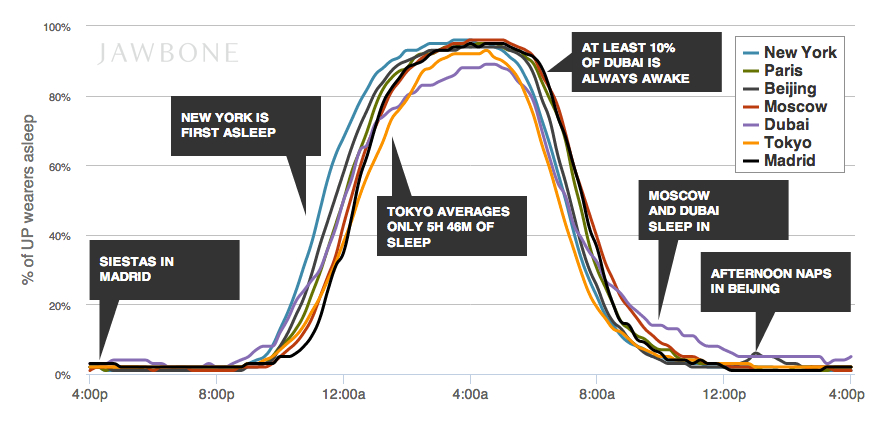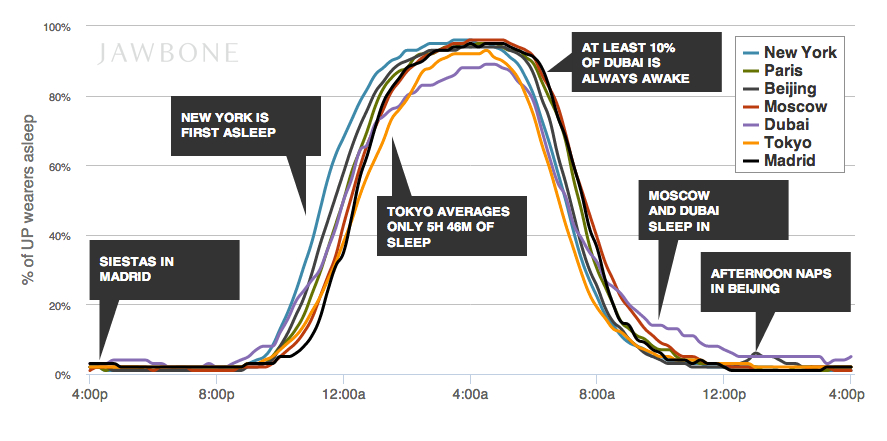New York gets to bed earlier than other major cities


A free daily email with the biggest news stories of the day – and the best features from TheWeek.com
You are now subscribed
Your newsletter sign-up was successful
So much for "the city that never sleeps." Jawbone makes a smart bracelet called UP that tracks your every step — literally — as well as the details about when you go to bed and rise. The point of the bracelet is to help people improve their health, but it also provides Jawbone with a treasure trove of data, as company data analyst Brian Wilt notes at the Jawbone blog.
Wilt uses this data to study cities, each of which, he says, has "a distinct 'thumbprint,'" a "unique way its citizens live their lives." He and his colleagues created unique data maps for New York and 20 other U.S. cities, plus some major metro areas around the world. Of these cities, Tokyo gets the least sleep (5 hours, 44 minutes), Australia gets the most (Melbourne: 6 hours, 57 minutes) and goes to bed the earliest (Brisbane, 10:57 pm), and Moscow is the last to bed (12:46 am) and last to rise (8:08 am).
But then Wilt narrows it down to seven of the world's largest cities — New York, Paris, Beijing, Tokyo, Moscow, Dubai, and Madrid — and creates this chart:
The Week
Escape your echo chamber. Get the facts behind the news, plus analysis from multiple perspectives.

Sign up for The Week's Free Newsletters
From our morning news briefing to a weekly Good News Newsletter, get the best of The Week delivered directly to your inbox.
From our morning news briefing to a weekly Good News Newsletter, get the best of The Week delivered directly to your inbox.

"New Yorkers work hard and play hard, and they're the first to bed and among the first to rise," Wilt explains. If you click over to the site, the chart is interactive. And the city that never sleeps? Dubai, apparently. Granted, this is a self-selected sample of people who buy smart bracelets, but perhaps somebody should rewrite the lyrics of "New York, New York"?
A free daily email with the biggest news stories of the day – and the best features from TheWeek.com
Peter has worked as a news and culture writer and editor at The Week since the site's launch in 2008. He covers politics, world affairs, religion and cultural currents. His journalism career began as a copy editor at a financial newswire and has included editorial positions at The New York Times Magazine, Facts on File, and Oregon State University.
-
 Elon Musk’s pivot from Mars to the moon
Elon Musk’s pivot from Mars to the moonIn the Spotlight SpaceX shifts focus with IPO approaching
-
 ‘Hong Kong is stable because it has been muzzled’
‘Hong Kong is stable because it has been muzzled’Instant Opinion Opinion, comment and editorials of the day
-
 Magazine solutions - February 20, 2026
Magazine solutions - February 20, 2026Puzzle and Quizzes Magazine solutions - February 20, 2026
-
 Nobody seems surprised Wagner's Prigozhin died under suspicious circumstances
Nobody seems surprised Wagner's Prigozhin died under suspicious circumstancesSpeed Read
-
 Western mountain climbers allegedly left Pakistani porter to die on K2
Western mountain climbers allegedly left Pakistani porter to die on K2Speed Read
-
 'Circular saw blades' divide controversial Rio Grande buoys installed by Texas governor
'Circular saw blades' divide controversial Rio Grande buoys installed by Texas governorSpeed Read
-
 Los Angeles city workers stage 1-day walkout over labor conditions
Los Angeles city workers stage 1-day walkout over labor conditionsSpeed Read
-
 Mega Millions jackpot climbs to an estimated $1.55 billion
Mega Millions jackpot climbs to an estimated $1.55 billionSpeed Read
-
 Bangladesh dealing with worst dengue fever outbreak on record
Bangladesh dealing with worst dengue fever outbreak on recordSpeed Read
-
 Glacial outburst flooding in Juneau destroys homes
Glacial outburst flooding in Juneau destroys homesSpeed Read
-
 Scotland seeking 'monster hunters' to search for fabled Loch Ness creature
Scotland seeking 'monster hunters' to search for fabled Loch Ness creatureSpeed Read
